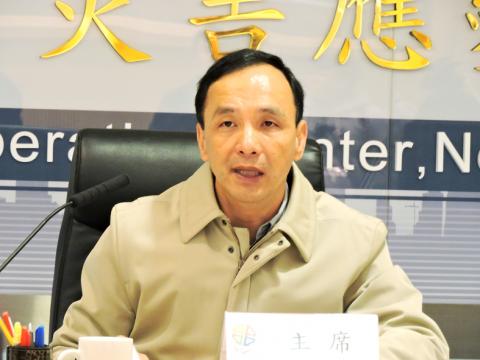The motion to set up a constitutional amendment committee was passed yesterday by the legislature’s Procedure Committee to be placed on the agenda for the next legislative floor meeting on Friday.
The Chinese Nationalist Party (KMT) has taken up long-proposed calls for constitutional amendments after its rout in last month’s nine-in-one elections.
A group of KMT legislators worked last week to align with opposition lawmakers to propose the establishment of a constitutional amendment committee in a bid to solve a constitutional-political impasse said to have led to political upheavals in the past few years.

Photo: Taipei Times
KMT Legislator Johnny Chiang (江啟臣) and Democratic Progressive Party legislators Cheng Li-chiun (鄭麗君) and Lee Chun-yi (李俊俋) sponsored the motions to set up the committee, which according to law must be established to deliberate on revisions and reach resolutions.
KMT caucus whip Alex Fai (費鴻泰) said he expects the proposal to pass on Friday and added that a constitutional amendment team would be set up within the caucus to work out related issues.
The committee, if set up, would be the first since 2004.
Meanwhile, New Taipei City Mayor Eric Chu (朱立倫), the sole contender for KMT chairperson, reiterated that “constitutional amendments are a must.”
Chu has proposed revising the quasi-presidential system to a fully parliamentary system.
However, not everyone in the KMT seemed to like the idea, with Greater Taichung Mayor Jason Hu (胡志強), a KMT vice chairman, saying: “Do not try to abolish the presidential system out of dislike for President Ma Ying-jeou (馬英九).”
Chu did not respond to Hu’s remark directly, but said that dysfunction in the political system has been manifest for the past 20 years and witnessed by everyone in the nation.
He is not the only one who has expressed concern over the current situation, Chu added, saying that the government must be reformed into one that sees power commensurate with accountability.
“[Amendments] should not involve partisan biases and personal calculation,” he said.
Chu said that, regardless of one’s attitude toward the proposed parliamentary system, anyone who is to roll out the amendment project has to speak to academics, experts and politicians from different parties.
Chu said the party would not be ruled by a single person’s dictates or by an unchallenged “supreme leader.”

Alain Robert, known as the "French Spider-Man," praised Alex Honnold as exceptionally well-prepared after the US climber completed a free solo ascent of Taipei 101 yesterday. Robert said Honnold's ascent of the 508m-tall skyscraper in just more than one-and-a-half hours without using safety ropes or equipment was a remarkable achievement. "This is my life," he said in an interview conducted in French, adding that he liked the feeling of being "on the edge of danger." The 63-year-old Frenchman climbed Taipei 101 using ropes in December 2004, taking about four hours to reach the top. On a one-to-10 scale of difficulty, Robert said Taipei 101

Nipah virus infection is to be officially listed as a category 5 notifiable infectious disease in Taiwan in March, while clinical treatment guidelines are being formulated, the Centers for Disease Control (CDC) said yesterday. With Nipah infections being reported in other countries and considering its relatively high fatality rate, the centers on Jan. 16 announced that it would be listed as a notifiable infectious disease to bolster the nation’s systematic early warning system and increase public awareness, the CDC said. Bangladesh reported four fatal cases last year in separate districts, with three linked to raw date palm sap consumption, CDC Epidemic Intelligence

US climber Alex Honnold left Taiwan this morning a day after completing a free-solo ascent of Taipei 101, a feat that drew cheers from onlookers and gained widespread international attention. Honnold yesterday scaled the 101-story skyscraper without a rope or safety harness. The climb — the highest urban free-solo ascent ever attempted — took just more than 90 minutes and was streamed live on Netflix. It was covered by major international news outlets including CNN, the New York Times, the Guardian and the Wall Street Journal. As Honnold prepared to leave Taiwan today, he attracted a crowd when he and his wife, Sanni,

Taiwanese and US defense groups are collaborating to introduce deployable, semi-autonomous manufacturing systems for drones and components in a boost to the nation’s supply chain resilience. Taiwan’s G-Tech Optroelectronics Corp subsidiary GTOC and the US’ Aerkomm Inc on Friday announced an agreement with fellow US-based Firestorm Lab to adopt the latter’s xCell, a technology featuring 3D printers fitted in 6.1m container units. The systems enable aerial platforms and parts to be produced in high volumes from dispersed nodes capable of rapid redeployment, to minimize the risk of enemy strikes and to meet field requirements, they said. Firestorm chief technology officer Ian Muceus said